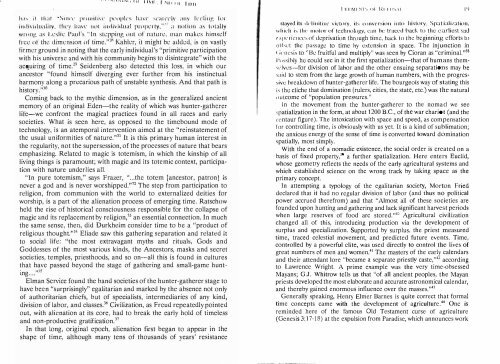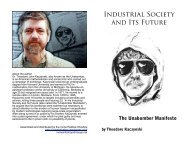CONTENTS - ouroboros ponderosa
CONTENTS - ouroboros ponderosa
CONTENTS - ouroboros ponderosa
You also want an ePaper? Increase the reach of your titles
YUMPU automatically turns print PDFs into web optimized ePapers that Google loves.
·'···""Jj!,tll 11'J<br />
'<br />
II'"<br />
"JIll 1r\IJ<br />
1t;1:-' il liI;11 "Silh"C IHilllitiv(" peopics !t;lvr scucciy allY rlTlill1--', for<br />
illdividu;tiily, Ihey I,ave 1101 illdividual properly,"" a 11\)lioil ;os loLally<br />
Wl"lll'f\ as Leslie Paul's "In steppillf\ ,)ul or Ilall1re, Illall makes himself<br />
free of the dimension of time."'" Kahler, it might be adueu, is on vastly<br />
firmer grounu in noting that the early inuividual's "primitive participation<br />
with his universe and with his community begins to uisintcgrate" with the<br />
acquiring of time." Seidenberg also detected this loss, in which our<br />
ancestor "found himself diverging ever further from his instinctual<br />
harmony along a precarious path of unstable synthesis. And that path is<br />
history."'o<br />
Coming back to the mythic dimension, as in the generalized ancient<br />
memory of an original Eden-the reality of which was hunter-gatherer<br />
life-we confront the magical practices found in all races and early<br />
societies. What is seen here, as opposed to the timebounu mode of<br />
technology, is an atemporal intervention aimcd at the "reinstatement of<br />
thc usual uniformities of nature."" It is this primary human interest in<br />
the regularity, not the supersession, of the processes of nature that bears<br />
cmphasizing. Relatcd to magic is totemism, in which the kinship of all<br />
living things is paramount; with magic and its totemic context, participa<br />
tion with nature underlies all.<br />
"In pure totemism," says Frazer, " ... the totem [ancestor, patron] is<br />
ncver a god and is never worshipped."" The step from participation to<br />
religion, from communion with the world to externalized deities for<br />
worship, is a part of the alienation process of emerging time. Ratschow<br />
held the rise of historical consciousness responsible for the collapse of<br />
magic and its replacement by religion," an essential connection. In much<br />
the same sense, theil, did Durkheim consider time to be a "product of<br />
religious thought."" Eliade saw this gathering separation and related it<br />
to social life: "the most extravagant myths and rituals, Gods and<br />
Goddesses of the most various kinds, the Ancestors, masks and secret<br />
societies, temples, priesthoods, and so on-all this is found in cultures<br />
that have passed beyond the stage of gathering and small-game hunt<br />
ing ... . "J5<br />
Elman Service found the band societies of the hunter-gatherer stage to<br />
have been "surprisingly" egalitarian and marked by the absence not only<br />
of authoritarian chiefs, but of specialists, intermediaries of any kind,<br />
division of labor, and classes." Civilization, as Freud repeatedly pointed<br />
out, with alienation at its core, had to break the early hold of timeless<br />
and non-productive gratification."<br />
In that long, original epoch, alienation first began to appear in the<br />
shape of time, although many tens of thousands of years' resistance<br />
I<br />
1',11,1\11' .... ,)'1:-.« II, 1






